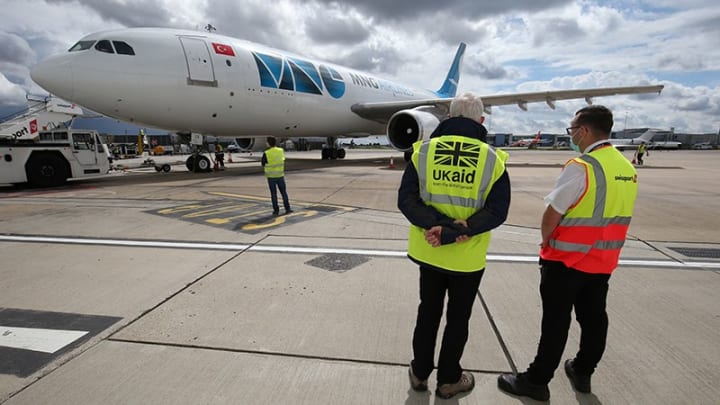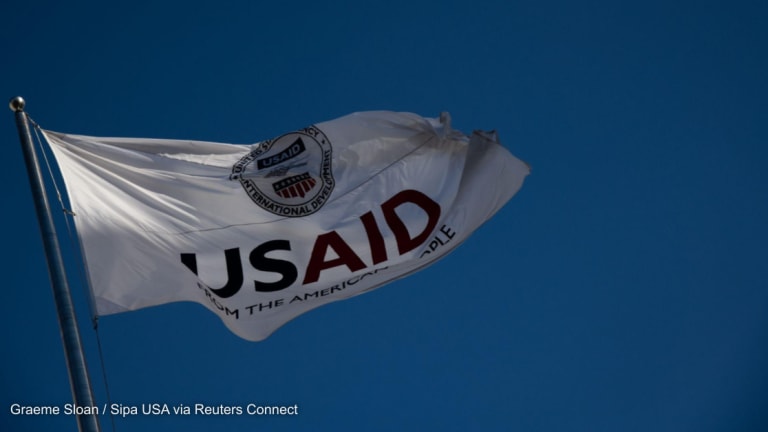
LONDON — The achievements of the U.K.’s Department of International Development over the last five years have been quietly released by the government, as the organization prepares to merge with the Foreign & Commonwealth Office next week.
In a bureaucratic swansong, the “DFID Results Estimates 2015-2020” sector report — likely to be one of the final publications by the department — highlights the vast reach of its work, with millions of people provided health, education, and economic support.
The results provide a strong benchmark against which to measure the development progress of the Foreign, Commonwealth and Development Office, being formed of DFID and FCO, which begins work on Sept. 1.
In depth for Pro subscribers: Conference call: The DFID-FCO merger
Former diplomat and development official Myles Wickstead and researcher Nilima Gulrajani join Devex for a conversation about the upcoming DFID-FCO merger and what it means for U.K. aid.
Nearly 34 million people received humanitarian assistance from DFID between 2015 and March 2020, in the form of food aid, cash, and voucher transfers. The vast majority, 18.4 million, were located on the African continent, but U.K. aid also supported 6.9 million people in Yemen and 1.5 million and 1.6 million people in Bangladesh and Pakistan respectively.
Fifty four percent of DFID’s £10 billion ($13.3 billion) 2018 budget was spent in fragile and conflict affected states that year, according to the publication. The department also adopted the Organisation for Economic Co-operation and Development’s definition of fragile states in 2020, the report noted.
Aside from DFID’s humanitarian work, the report showed significant accomplishments in the realm of health. Over the past five years, 55.1 million infants, women of childbearing age, and adolescent girls were reached by the department’s nutrition programs, 61.8% of them in Africa, and nearly 80% of them in places deemed fragile.
Over the same timeframe, 62.6 million people were reached by clean water and better sanitation programs, and 74.3 million children were vaccinated with the DFID support, which the report estimates saved 1.4 million lives.
Family planning was a key area within health, with an average of 25.3 million women and girls receiving “modern family planning methods” every year since 2015, according to the report, around half in fragile states.
The number of women reached dropped from a peak of 30.9 million in 2017-18 to just over 25 million in subsequent years. Still, over 2019 to March 2020, “at least 25.4 million total women and girls were reached, preventing 8.8 million unintended pregnancies; 2.9 million unsafe abortions; saving 8,100 women’s lives; and preventing the trauma of 81,900 stillbirths and 48,300 new-born deaths,” the report sated.
Between 2017-2019, 166.1 million people with neglected tropical diseases such as lymphatic filariasis, trachoma, schistosomiasis, visceral leishmaniasis, onchocerciasis, and guinea worm were treated through DFID-funded programs.
Outside of health, 15.6 million children were supported to gain schooling, according to the report. It said: “All DFID education programmes include a focus on quality of education, so all children counted are being helped to gain a decent education.”
Girls’ education has been a strong focus of the U.K. government’s development policy, and of the 14.9 million students whose gender were recorded, 8.1 million were female. At least 65% of these students were from fragile countries.
In terms of economic support, DFID helped 69.2 million people access finance, just over half of them women.
Nearly 60% of these people were in Asia, though a substantial 38.8% were in Africa, and just 1.3% in the Middle East. The report also claimed DFID helped 5 million people to increase their incomes, maintain their livelihood or to get a better job, though the majority, 3.5 million of them, were men.




